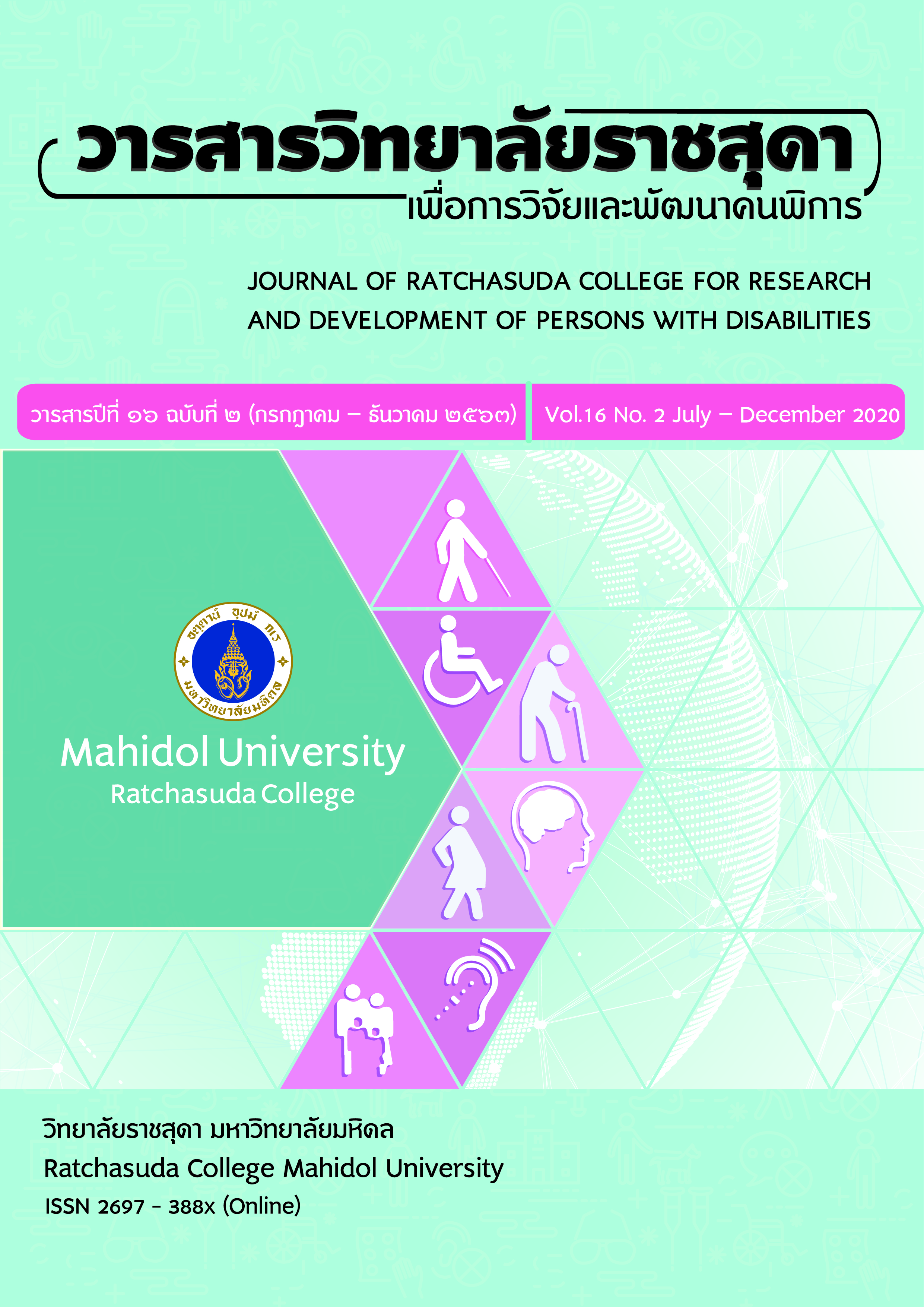The Effects of Parent Management Training Program on Knowledge, Attitude, and Child caring for the Children with Learning Disability
Keywords:
Parent Management Training, Children with Learning Disabilities, Knowledge, Attitude, Child CaringAbstract
This study aimed 1) to develop parent training program for parents of children with learning disabilities. 2) to compare the knowledge, attitude, and child caring skills of parents whose children diagnosed with learning disabilities. 3) to compare the knowledge, attitude, and child caring skills of parents from the experimental and control group. 4) to evaluate the persistence of the knowledge, attitude, and child caring skills of parents from the experimental group, after the training ended immediately, at one month, and three months. The research was designed as Quasi experimental research pretest posttest control group design. The samples were parents of children aged between 6-12 years old with learning disabilities at Chiang Rai prachanukroh Hospital from 1 January to 31 December 2018. The sampling of 2 groups was done by simple random sampling, 8 parents for intervention group, and 11 parents for control group. Instruments were used which were 1) Intervention adapted from parent management training of Department of Psychiatry, Faculty of Medicine Siriraj Hospital. Intervention had period weekly for 8 session. 2) Learning disability questionnaire. 3) The questionnaire of Attitude to take care children with learning disabilities. 4) Child caring questionnaire (parents Form). 5) Child caring questionnaire (children Form). The Wilcoxon Matched Pairs Signed-Ranks Test and The Mann-Whitney U test were used for data analysis. Results: After Parent training program, Intervention group significantly higher scores in Knowledge at p = .05. Attitude and child caring did not differ significantly between Pre-and Post-test evaluation. Before and after Parent training program, Knowledge, attitude and child caring did not differ significantly between Intervention group and control group. There was no significant change in posttest and 1 month and 3 month follow up.
Downloads
References
Choomchuay, J. (2002). Parent training programs. In Piyasin, W., & Katumarn, P., (Eds.) Textbook of Psychology (pp. 425-427). Beyond interprise Publisher.
Costin, J., & Chambers, SM. (2007). Parent management training as a treatment for children with oppositional defiant disorder referred to a mental health clinic. Clinical Child Psychology and Psychiatry. 12(4), 511-524.
Department of Mental Health, Ministry of Public Health. (2001). Training (4th ed.). Wongkamol Publisher.
Epstein, M. H., Polloway, E. A, Foley, R. M, & Patton, J. R. (1993). Home work : A comparison of teachers’ and parents’ perceptions of the problems experienced by students identified as having behavioral disorders, learning disabilities, or no disabilities. Remedial & Special Education. 14(5), 40-50.
Kaeokangwan, S. (2013). Attention deficit disorder with hyperactivity child, exceptional psychology, child. (6th ed.). Mohchaoban Publishing.
Kayama, M., & Haight, W. (2014). Disability and stigma : How japanese educators help parent accept their children’s difference. Social Work, 59(1), 24-33.
Makbunsri, T. (2006). Efficacy of parent management training program for ADHD. (Master’s thesis). Retrieved from http://cuir.car.chula.ac.th/handle/123456789/13899
Pornnoppadol, C. (2015). Specific learning disorder. In Sitdhiraksa, N., Wannasewok, K., Wannarit, K., Pukrittakayamee, P., Apinuntavech, S. and Katumarn, P., (Eds.) Siriraj Psychiatry DSM-5 (pp. 507-515). Prayurasard Publisher.
Pornnoppadol, C., Rohitsuk, W., Hasdinra, M., Yasintron, N., & Vasupanrajit, A. (2015). Parent training management program. Ruenkaewprinting.
Punyapas, S., Techapoonpon, K., Tarugsa, J., & Seree, P. (2015). Knowledge and attitude about learning disorders among parents. The Psychiatric Association of Thailand, 60(3). 158-168.
Sofronoff, K., & Farbotko, M. (2002). The effectiveness of parent management training to increase self-efficacy in parent of children with Asperger syndrome. Sage journal. National Autistic Society. 6(3), 271-286.
Soongprasit, M. (2015). Specific learning disorder. In Lotrakul, M., & Sukanich, P., (Eds) Ramathibodi Psychiatry DSM-5 (pp. 515-521). Department of Psychiatry. Faculty of Medicine Ramathibodi Hospital.
Tews, L., & Merali, N. (2008). Help chinese parents understand and support children with learning disabilities. Professional Psychology. Research and Practice. 39(2), 137-144.
Downloads
Published
How to Cite
Issue
Section
License
บทความที่ได้รับการตีพิมพ์เป็นลิขสิทธิ์ของวารสารสถาบันราชสุดาเพื่อการวิจัยและพัฒนาคนพิการ






